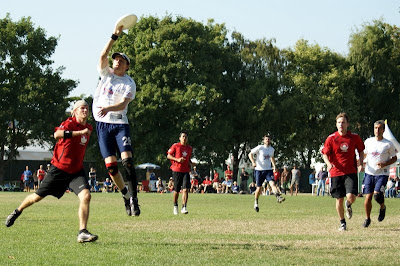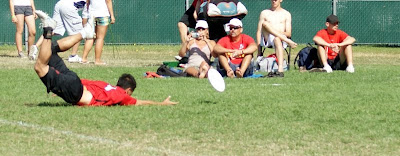For those of you who don't follow all the details about the series, you might want to check out the bids from the different regions.
http://www.upa.org/club/2008_club/2008_fall_wildcards.shtml
PJ
Tuesday, September 30, 2008
UPA Bids up - Northeast!!!
Knowledge coaching and players
Here's a great quote: "what a coach knows but his players don't is irrelevant when it comes to winning games". This I interpret, as a coach, is your goal is to convey information about the game, the situation, and the skill to your players. This passing of information is done at practice and in games.
Seems simple, but there's the classic communication channel that makes it hard. Any message is never completely received and internalized. Even a simplified communication model with a sender and receiver is never perfect, and all of a sudden, we as coaches are faced with communicating with groups of 10 or more. Each receiver has its' own bias, learning methods, and previous state of mind. In other words, it's not simple.
I won't say that I have all the answers, but here are some techniques that I've felt had positive results. I'm basing the quality of my results by observing the changes in player and team adjustment.
Techniques:
- Repeat - Repeating the message and repeating the drill is a classic technique that we've all been exposed to. The challenge is how much repetition before people get bored and block out the learning. One secret is the next point...
- Incremental - Teach concepts by incrementing the amount of information. The challenge here is the imbalances of preexisting knowlegde, and time constraints on your team.
- Blackboard it - I like to talk theory (obviously) and draw theory and then practice it. We blackboard with release of documents that specify theory, we illustrate plays with the classic hat X and O work, and we review practices on a blog trying to reemphasize the major points.
- Be transparent - There's no why/because. Everything that you do and your plans need to be open to the team. In a few cases, surprises can be kept back to test out your team's reaction to a simulated situation, but in general, if they know the plan, then they can prepare themselves for it. I find this one is challenging for practices since the plan evolves, and I don't always have tonnes of time to prepare. At least, I tell the team what we're doing at the start of a practice.
- Take questions - This one is always tricky since questions can dominate time. Also, try to stay away from the whatif questions.
- Don't bore them - We need to communicate, but doing and adjusting people while drilling is just as valuable. Studies have shown that we don't have great attention spans, so keep the messages short and sweet.
Friday, September 26, 2008
Link Friday - Blogs and Credit
My favourite links this week are:
- [New/old blog] Strange that I've never seen this blog. It has been around for some time, but for my personal first time, I enjoyed the content and will add it to my reader. Checkout "Thoughts".
- This last blog led me to here to another Dartmouth Blog.
- And then Injury time out for Ultimate players
- And another, You didn't hear it from me by Ken Dobyns.
- More financial education...the first time I watched this I was shocked and scared. More horror films for the rational mind to ponder.
Thursday, September 25, 2008
Poll Thursday - Let the Regional guesses begin
Last week we polled over what we're buying relative to Ultimate. Most of my money goes in getting to and playing at tournaments. I, currently, buy jerseys, but not many discs these days.
With many of the sectionals completed, we might as well take some guesses of who you think are going to get out of the regionals and get their tickets to Florida. Unfortunately, the bid information isn't known yet, so I'll leave the number of picks you can make open. We'll start with the teams that are up on the score reporter. Mid-Atlantic Mixed, Mid-Atlantic Women's, Northwest Open, Northwest Women's, South Masters, South Mixed, Northwest Masters, Northwest Mixed, and Southwest Masters (polls right).
PJ
Wednesday, September 24, 2008
Toronto's past is not London's future
I saw and lived in the Toronto Ultimate scene for seven years. Now I'm living in London, England, and I've joined in the Ultimate scene here to a minor degree for about 6 months now. In this post, I'm going to describe some of what we experienced in Toronto, and how things are different now and how I would change them.
I experienced what I would call a revolution (or evolution) in Toronto Ultimate in terms of Open Touring Ultimate. When I started touring, there was no tryouts or teams for the bottom end players, and I got on a team by talking to veterans to get a chance to play. There were a number of disjoint teams that made up the Toronto scene. That season, we didn't practice and attended a few tournaments. Still, that was enough to peak my interest.
At the same time, I had found the University of Toronto's Ultimate team, and was given some great experiences on the B-team. I met some veterans who were willing to teach what they knew to a eager developing players.
The next year, I decided to fill the gap in Toronto, with some friends, and made a bottom level team. The players on this team went on to influence Toronto Ultimate to this present day. Also, UofT went through a change, and I was given the reigns of the club with no or little real Ultimate experience. My basketball and hockey experience were, however, existent as I had coached and captained teams in the past.
Some key players came along at UofT and they made pushes in the middle levels of Toronto for a team that filled the gap between elite Ultimate and elite development. This team is known as Grand Trunk. In Grand Trunk's initial year, the talent influx we had turned heads at the more elite level, Goat, and soon there was a talent crossover. This combined group with lots of work had the insight to create the present Open system in Toronto where three teams (hopefully four in the coming years) provide both development and opportunity for the development of elite players.
Toronto has had varying success with this Open system, and that will be tested in years to come. Many people have thought about how to innovate and worked toward a common effort of improving the quality of Ultimate in the area. I've left the scene, but as long as improvement of Universities in the region continues and the local innovation continues, Toronto Open Ultimate is in a good place.
Experiencing this evolution/revolution from a city of disjoint efforts to a mostly common move forward makes you immediately wonder if the same can be done in a new city. London, however, has some differences.
The exciting things about London that excite me are:
- Large diverse population
- Lots of green space
- Easy travel to tournaments
- Many schools in the area
- A country that loves sport
- Disjoint team efforts
- Little youth development
This lack of competition means that, as my previous post suggests, the rational costs in the game are different here. First off, the players in London, and to a greater extent the UK, need to decide what the goal is in terms of the top level of the game.
How do I think London should evolve its' Open system? Well, first off, my motivation would be to see the UK medal at the World club and national tournaments. To do this, all the teams in the region need to improve to raise the competition level.
My current thoughts to this end are, instead of concentrating talent and building a hierarchy like in Toronto, the city is better off in diversifying talent across teams, building a high-level league structure, and then concentrating talent for big tournaments.
A league? Yes a league. For some reason, a country that geographically is not the big, uses Tournaments as the main form of play. Individual matches, as mentioned in a post at the Process of Illumination, there is an opportunity as stated in the post, "Smaller rosters will elevate the ceiling in the game between the best teams".
Living in a high concentration of population suggests that a league structure makes more sense to improve talent as opposed to the tournament structure. I'm fine with the tournaments, but regular match play against local equal teams will lead to faster evolution and improvements than a few tournaments and internal training. London, itself, could support 4 or more strong club Open teams. That with the North would make a league of eight that would provide for faster development, higher quality Ultimate, and a potential setting for fans.
As an aside, I suspect that North American influence has lead to tournament play in the UK. The tournaments are great fun, but they make little sense at the top level. I'm surprised that leagues and regular top quality competition isn't intertwined with regular tournament play.
Tournaments still need a place, so that the teams here can acclimatize to the wars of attrition in tournament play, but that should not be the primary focus.
Some early initiatives are focusing on passing knowledge between club teams and college teams. This is great, and the college scene here needs to drive the club scene forward. Currently, I'm focusing on a few initiatives. My first focus is on college Ultimate in London with Kings and Imperial, and depending on my health next season, we'll see what other moves I make come the new year. As usual this will be fun, and another opportunity to learn more about this sport we play.
PJ
Tuesday, September 23, 2008
The logic of life ... Ultimate?
I read one of those books that makes you think. I really enjoyed "The Logic of Life" by Tim Harford much like I enjoy most economic conversation books. I could talk about some of the fascinating ideas that the book brought up about prostitution, why we live in cities, and how neighbourhoods work, but this is an Ultimate blog, so let's relate it to Ultimate.
 Pictured Above: More great GUT shots. Here we see the eventual winners, team USA in white, setting up for the throw.
Pictured Above: More great GUT shots. Here we see the eventual winners, team USA in white, setting up for the throw.One of the driving concepts in book is the rational approach we, people, all take, whether conscious or unconscious. This rational choice dictates how we behave. This concept when applied to Ultimate might give us some insight. If we could break down and understand why we play the sport at different levels, then players and coaches might have a better understanding of how to drive teams and individuals towards their goals.
With Ultimate, the starting point lies in the fact that we don't make money in this sport (or generate a gross income). This means we need to examine the other base costs of our game.
First off, we can look at the negative costs:
- Time - practice, travel, weekend and holiday time, league nights, socializing... It's a major cost that trades off friends and family for Ultimate (which includes some friends and family).
- Money - equipment, travel, fees, and, arguably most important, lost opportunity cost (my friend Phil's thinking).
- Body Damage - this sport can hurt.
- Social - the people that play Ultimate, and the people you meet make this game great. Also, the events that we participate including tournaments and games are fun.
- Health - pretty simple statement is Ultimate is a great form of exercise.
- Competition - Ultimate and it's developing stage means you can experience competition at a high level very quickly. Regardless of level, we all like to compete.
- Fame - we all like to be known. Ultimate is no exception, and people like to be famous. It's always fun to tell someone outside the sport, such as friends and family, that you play Ultimate at a regional, national, or international level in a sport.
- Challenge - learning and achieving bring great joy to most people.
The next question is, can you use this knowledge, if you could understand these costs realtive to yourself and your team? As a coach or captain, it does help to understand how much social versus how much competition a team needs. If this is unbalanced for your team, then you'll lose people as their cost functions shift to group 1. This emphasizes the importance of making a team ethos so that up front people know what they're getting involved in.
The unfortunate reality, is that all these costs both in group 1 and group 2 are not independent of one another. As usual these things are comples. More competition means more costs since you, likely, have to travel further. Health and body damage are in direct contrast to each other.
I'm still working out how to evaluate myself and my teams in terms of my/their motivations, but being aware of these concepts gives you a rough tool that can help you understand team and individual behaviour, especially in tough times.
PJ
Monday, September 22, 2008
Photos V - Worlds finals and Gut shots
These are the last pictures from Worlds. These are mostly finals pictures from Junior Open, Master's, Women's, Mixed, and Open. Also, check out the Guts photos. I really took a liking to that sport.
PJ










































































